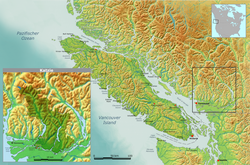Katzie First Nation
Katzie First Nation
q̓ic̓əy̓ Katzie Nation | |
|---|---|
 Traditional territory of the Katzie First Nation | |
| Country | Canada |
| Province | British Columbia |
| Government | |
| • Type | Band council |
| • Chief | Grace George |
| • Councillors |
|
| Area | |
• Total | 3.41 km2 (1.32 sq mi) |
| Population (2024) | |
• Total | 563 |
| • On reserve | 310 |
| • Off reserve | 253 |
| Time zone | UTC-8 (PST) |
| • Summer (DST) | UTC-7 (PDT) |
| Ethnic group | Stó꞉lō |
| Languages | |
| Reserves |
|
| Website | katzie |
The Katzie First Nation or Katzie Nation (Hunquminum: q̓ic̓əy̓) is a First Nation whose traditional territory lies in the Lower Fraser Valley of British Columbia, Canada. According to their oral tradition, the Katzie people are the descendants of the Oe'lecten and Swaneset communities, two of five established by the Creator in present-day Greater Vancouver.
Origins and etymology
According to their oral tradition, the Katzie people are descendants of the five communities established by the Creator in what is now known as Greater Vancouver.[2] The Creator assigned a chief to lead each community: Oe'lecten (θéləctən) at Pitt Lake, Swaneset at Sheridan Hill (in Pitt Meadows), Xwoe'pecten at Port Hammond (in Maple Ridge), C'simlenexw at Point Grey (in Vancouver), and Smakwec at Point Roberts (in Washington, US).[3] The Katzie people are primarily the descendants of Oe'lecten and Swaneset, while the descendants of Xwoe'pecten, C'simlenexw, and Smakwec became the Kwantlen, Musqueam, and Snokomish peoples, respectively.[2][4] The Snokomish people were wiped out by a smallpox epidemic in the 18th century.[2]
"Katzie" is an anglicization of the Hunquminum name q̓ic̓əy̓, which means "land of the moss". The Katzie people's oral tradition credits the name to Swaneset.[4]
It is said that Swaneset, at the behest of the Creator, shaped the land of his area so that it would be abundant in berry and root crops and thus suitable for human life. He then travelled to the sky and returned to Earth with a sky wife who instructed the people of the area to pile up moss to form the foundation for a village site. She later released eulachon into the Fraser River (Stó꞉lō) and taught the people how to catch and prepare the fish for consumption. Within Swaneset's lifetime, the Katzie community had grown to 12 separate villages. Swaneset is said to have secured an abundance of sockeye salmon for the Katzie people through his second marriage to the daughter of the chief of the "sockeye people".[2]
Treaty process
The Katzie Nation are negotiating their land treaty independently, and are not part of either Sto:lo tribal councils (the Sto:lo Nation and the Stó:lō Tribal Council).
Golden Ears Bridge agreement
As the new Golden Ears Bridge was in Katzie territory, the nation signed a Benefit Agreement with TransLink in September 2004 to establish the responsibilities of both parties.
Territory and governance
Traditional Katzie territory includes the entire Pitt watershed, including the Alouette watershed, the Fraser River, lands adjacent to Point Roberts, and lands between the Fraser and Boundary Bay. There are approximately 592 members of the Katzie First Nation (their Indian Act-mandated government), and 302 are currently living on their five reserves.
Reserves
The Katzie Nation manages the affairs of residents of five reserves assigned to the Katzie, focused on the area of Pitt Meadows, where the band headquarters are located. Other reserves are on Barnston Island and at Yorkson Creek in Langley, British Columbia. These reserves are:[5][6]
- Katzie 1, one mile west of Port Hammond on right (north) bank of the Fraser River, 44.10 ha.49°12′00″N 122°40′00″W / 49.20000°N 122.66667°W[7]
- Katzie 2, opposite Port Hammond on the left (south) bank of the Fraser River, 23.10 ha.49°12′00″N 122°39′00″W / 49.20000°N 122.65000°W[8]
- Barnston Island 3, south shore of Barnston Island, 54.6 ha.49°11′00″N 122°42′00″W / 49.18333°N 122.70000°W[9]
- Pitt Lake 4, at south end of Pitt Lake, at outlet into Pitt River, 218.50 ha.49°21′00″N 122°36′00″W / 49.35000°N 122.60000°W[10]
- Graveyard 5, one mile north of Port Hammond, 0.40 ha. 49°13′00″N 122°39′00″W / 49.21667°N 122.65000°W[11]
Population
As of February 2024, the band's population was 563, of whom 310 live on-reserve.[12]
Language
həṅq̓əmín̓əḿ, the downriver dialect of Halkomelem, is still spoken by Katzie peoples despite colonization attempts (including the Canadian Residential School System). Halkomelem is one of the Coast Salish, or Salishan languages.
References
- ^ "Chief & Council". Katzie First Nation.
- ^ a b c d "History of the Katzie People". History of Maple Ridge. City of Maple Ridge. Retrieved March 18, 2024.
- ^ Township of Langley – Our Shared History: Historic Context Statement and Thematic Framework (PDF). Donald Luxton & Associates Inc (Report). August 2017. p. 10.
- ^ a b "Who We Are". Katzie First Nation. Retrieved March 18, 2024.
- ^ "First Nation Detail". Crown–Indigenous Relations and Northern Affairs Canada. Government of Canada. Retrieved October 25, 2021.
- ^ Indian and Northern Affairs Canada, Reserves/Settlements/Villages Detail
- ^ BC Geographical Names entry "Katzie 1"
- ^ BC Geographical Names entry "Kaztie 2
- ^ BC Geographical Names entry "Barnston Island 3" Archived August 26, 2011, at the Wayback Machine
- ^ BC Geographical Names entry "Pitt Lake 4"
- ^ BC Geographical Names entry "Graveyard 5"
- ^ Indian and Northern Affairs Canada, Registered Population

